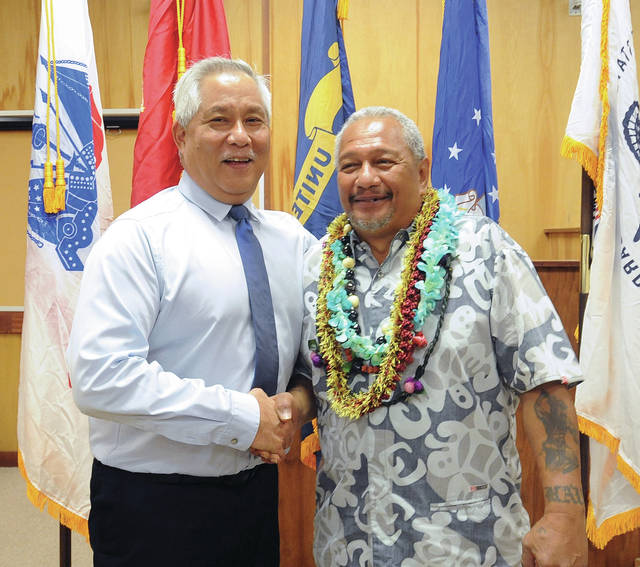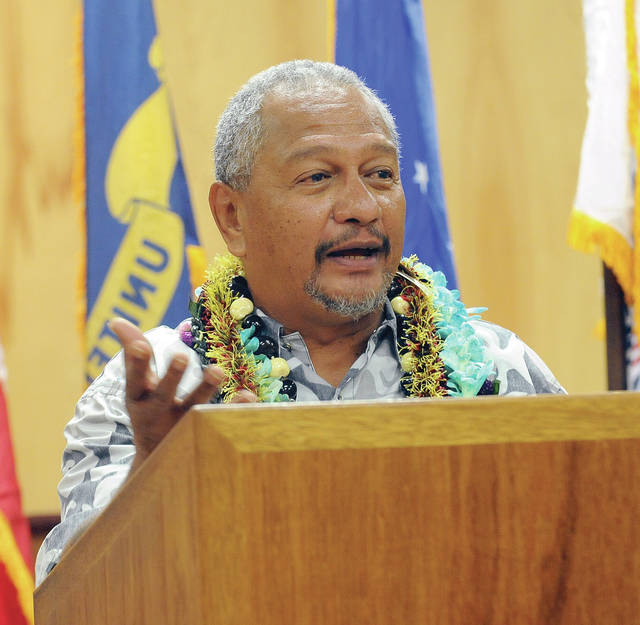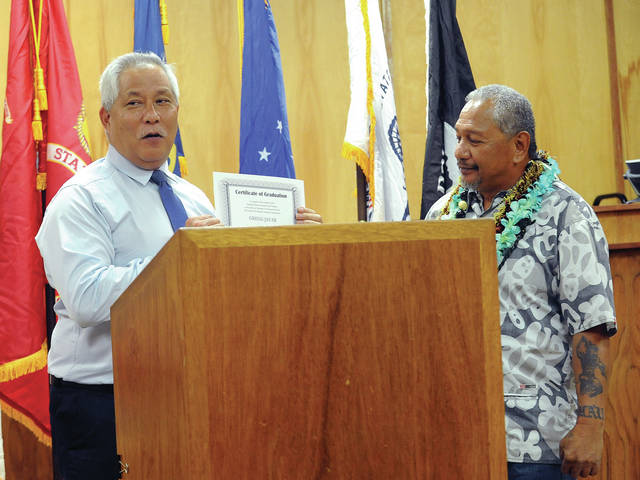KEALAKEKUA — Greg Javar couldn’t contain the smile on his face as the Big Island Veterans Treatment team talked about his journey to sobriety.
Javar was the sole graduate for the court’s 10th ceremony, which occurred Monday afternoon in 3rd Circuit Court on Halekii Street.
“I want to say thank you,” Javar’s wife Darlene said to the gallery of people in attendance. “We’re approaching our 34th anniversary and it’s taken an army to find the person I always knew he was.”
Darlene added addiction is a family disease, but she appreciates the efforts to save her husband — she believes the investment will be exponential.
Javar, 55, joined the Army National Guard in 1980 and served six years.
He was admitted to veterans court in September of 2016 after receiving a deferral for promoting a dangerous drug in the third degree. Throughout his time in the program, he was sanctioned on five different occasions for relapsing. However, he also received incentives on seven different occasions for helping his fellow veterans court participants in the program.
“What I’ve noticed doing drug court and veterans court everyone has their own path, their own journey — they’re as individual as the person,” said Deputy Prosecutor Mark Disher. “Greg’s was kind of like the old Saddle Road in the beginning. It was really rough at first, but once he started to accept and admit that’s when things changed.”
Deputy Public Defender Joanna Sokolow worked with Javar during his recovery.
“I want the community (to know) that this program works and Greg is evidence of that,” said Sokolow. “This is a tough program. We expect people to be tough and sometimes that means admitting weakness.”
Fran Duntz, a therapist who has worked with Javar throughout the years, also spoke at the ceremony. She recalled watching the relapses.
“I can remember pulling him along, pulling him by the teeth into understanding what the program was – and then he’d get that far and stop,” Duntz said. “So I had to get behind him now and start to push because he wanted to do it on Hawaiian time. And that wasn’t going to work for him.”
In the end, Javar succeeded with the help of his mentors, sponsors, veterans court team and his family.
“I just wanna say I’m so grateful for those who helped me,” Javar said to the people in the courtroom. “I want to thank the court for giving me this chance. They believed in me. They had hope and faith in me.”
Javar recalled his experiences within the program.
“Every time I’d come to the court Judge Fujino always told me, he believes that I can do it and that he likes me, too. And that gave me inspiration to believe I could,” Javar said.
Javar thanked his family for sticking with him throughout the years.
“One person I really wanna thank and appreciate is myself: you did a good job,” he added. “If it weren’t for veterans court I wouldn’t be here today.”
Judge Melvin Fujino is the judge veterans court participants report to while in the program. During Monday’s ceremony, he thanked Javar for his service to this country.
“You are a humble individual,” he said. “Thank you for the honor to watch you change.”
Fujino added that when people come to criminal court they’re telling people what they did wrong. His philosophy is the court also needs to let those individuals know what they do right.
“That’s why we give incentives and sanctions to help get you back on track,” the judge said. “We believe in you.”









it’s a choice
It is..